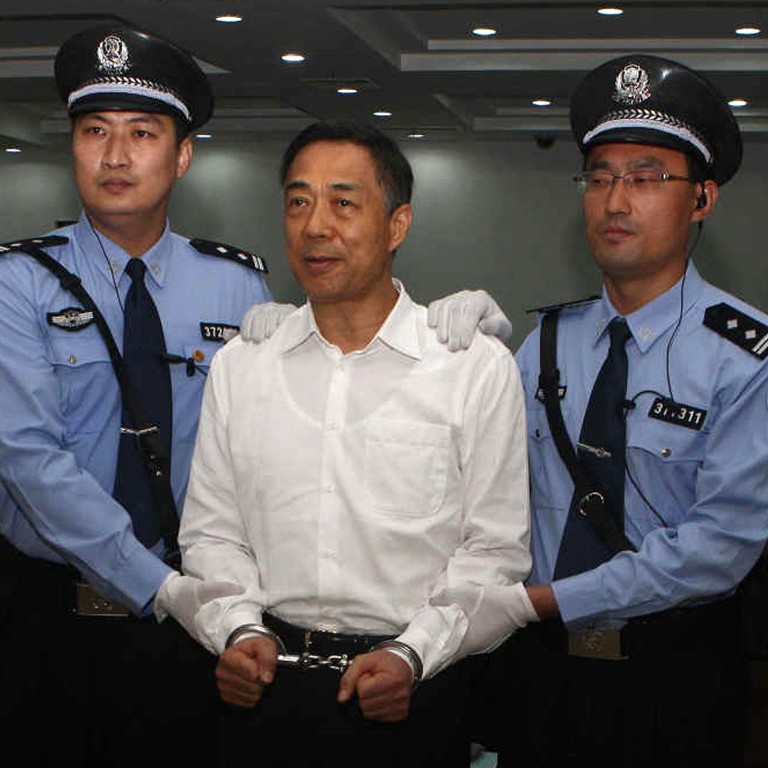
After Bo Xilai, corruption as usual
Zhiwu Chen says that, on its own, the high-profile punishment of errant officials won't serve the larger fight against corruption; institutional changes are needed to ensure abuse of power is less lucrative and its costs are much higher
One cannot open a Chinese newspaper these days without seeing a story about corrupt officials being hauled up. Is it, then, the beginning of the cleansing process promised by President Xi Jinping ? It sure is. China's new leadership is speeding up efforts to crack down on corruption, the most prominent example being the recent life sentence for Bo Xilai. But chances are that corruption will continue unless China first undertakes key reforms to reduce private benefits from corruption and increase the perceived costs.
In recent decades, it has become almost routine. Each new administration starts off with a political anti-corruption campaign but without the constitutional reforms to check official power. Other than taking out a few in opposing political factions, these campaigns mostly served to make corruption worse. This time can be different, but several reforms are a prerequisite.
First, China must curb the rewards from corruption, which have grown tremendously, making it hard to resist. To put this in perspective, we should note that, during the Qing dynasty, government revenue was low; for example, during the mid-18th century, the government took in about 50 million taels of silver, roughly equal to the annual income of two million Beijing residents. Under the People's Republic, in 1995, fiscal revenue equalled the disposable income of 150 million urban residents. But, by last year, total fiscal revenue was 11.7 trillion yuan (HK$14.8 trillion), equal to the disposable income of 477 million urban residents.
Fast-growing government budgets have unquestionably created more and larger opportunities for corruption. This is particularly true since the 2008 financial crisis, as a 4 trillion yuan (HK$4.5 trillion) stimulus package paved the way for numerous infrastructure projects. To reverse this trend, the power of taxation must be subject to checks and balances, which requires constitutional reforms and a free press. Without a functioning constitutional system, the ever-increasing potential rewards make corruption too attractive.
Second, the number of employees on the government payroll, and in positions of power, have expanded significantly, creating more room for corruption. According to Ren Yuling, a member of the Chinese People's Political Consultative Conference, the ratio between government employees and the general population was 1 to 7,955 during the Han dynasty; 1 to 910 during the late Qing dynasty; 1 to 67 at the beginning of recent reforms in 1979; 1 to 40 as of 1995; and 1 to 19 in 2005.
According to an estimate by Professor Zhou Tianyong, of the Central Party School, there were more than 70 million government employees in 2005, many of whom possessed power over sizeable budgets or controlled approval authority for various industries. The real estate industry, which has experienced tremendous growth in the past 15 years, is particularly prone to corruption, as each local government has a monopoly over land supply for development.
There is also limited oversight of the expansion and exercise of power besides that which is provided by Communist Party committees. The anti-corruption bureau, the national auditing bureau and other similarly intentioned institutions do not act independently of the party. Neither do the legislature or the judiciary provide independent checks and balances on offices of the executive branch. As a result, people in positions of power have often served themselves well by expanding the boundaries of their power.
Third, media freedom is restricted, helping to lower the private cost of corruption even further. Until recently, the widening adoption of the internet and mobile devices for news and information had provided a relatively free platform for uncovering official misconduct. Unfortunately, many officials viewed -based anti-corruption efforts as political activism, threatening stability and challenging the party's rule.
With the detention and arrest of online opinion leaders and activists since July, the recent government campaign to ideologically cleanse the space has succeeded in silencing critical voices, dramatically raising the cost of reporting corruption.
The Bo case is another telling example of how an anti-corruption trial could be conducted without affecting the fundamentals of corruption. Bo's trial should really have been about his gross abuse of power and disregard for the law during his years in office. Instead, it was transformed into a soap opera, a "sex, love and violence" triangle featuring his wife, his Chongqing police chief and himself.
The trial did little to address loopholes in the governance structure that have made it possible for such gross abuse of power to occur. Bo's trial was a wasted opportunity to reflect on the institutional system and ignite reforms towards a functioning constitutional democracy.
Constitutional reforms, transparency and free speech are needed if China wants to fight corruption. Periodic political campaigns, even the dramatic sentencing of a top official like Bo, can produce newspaper headlines but have limited lasting effect on official behaviour.

